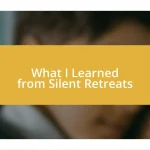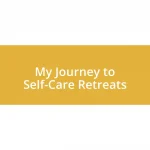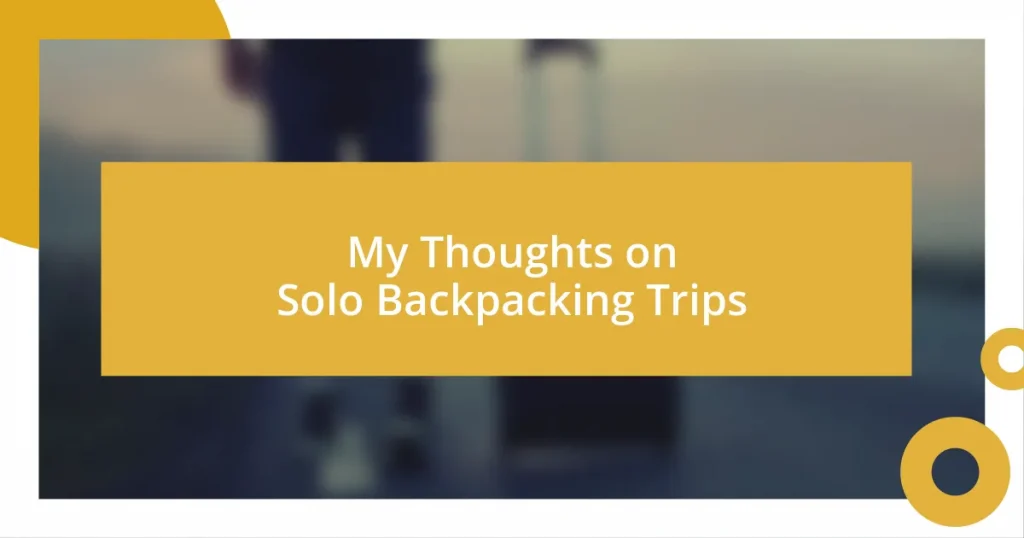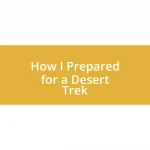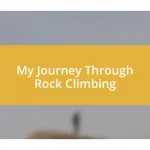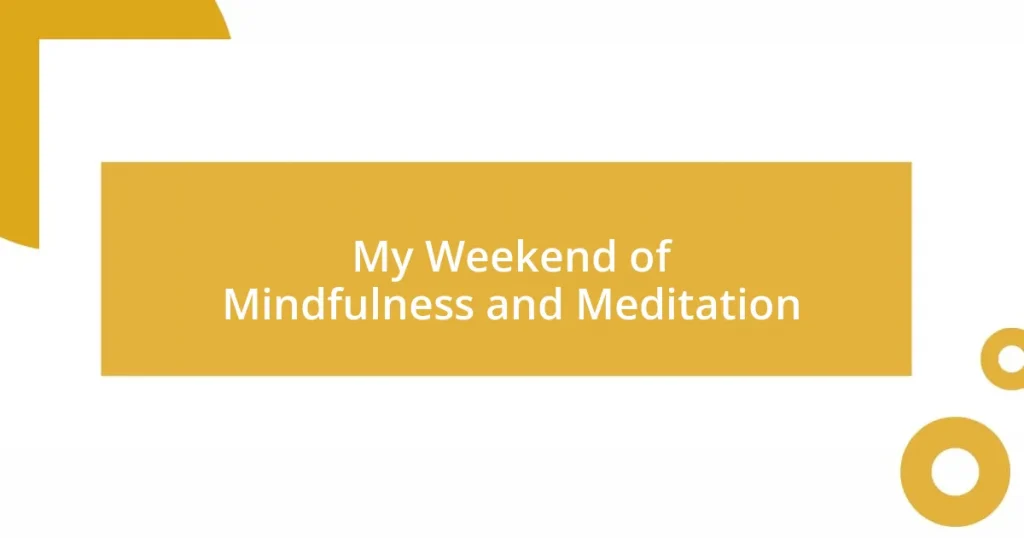Key takeaways:
- Solo backpacking fosters personal growth, resilience, and a deeper connection with nature.
- Essential gear includes a comfortable backpack, lightweight tent, and navigation tools for a safer experience.
- Planning should prioritize safety by sharing itineraries and being flexible for unexpected changes.
- Staying connected through technology, budgeting, and reflecting after trips enhances the overall adventure.
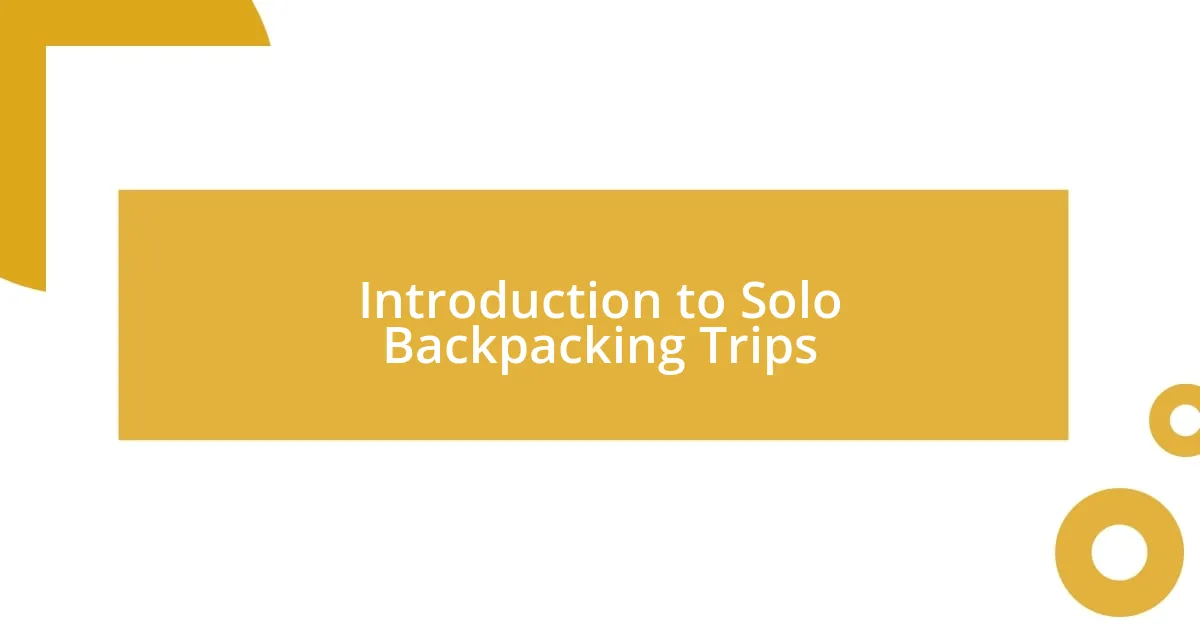
Introduction to Solo Backpacking Trips
Solo backpacking trips have a unique allure that can be both thrilling and intimidating. I remember my first solo adventure—it felt like stepping into a vast unknown, where the weight of my pack mirrored the excitement in my heart. Have you ever wondered what it’s like to navigate the world all on your own, guided solely by your instincts?
The freedom of solo backpacking is something truly special. With each step, you’re not just exploring new landscapes; you’re also discovering parts of yourself you might not have known existed. As I wandered through the mountains, alone with my thoughts, I found clarity in the solitude. Isn’t it fascinating how being alone in nature can spark introspection and creativity?
Engaging with the world on a lone journey can foster a deep connection not only with your surroundings but also with your inner self. I recall sitting by a serene lakeside, reflecting on my life choices and aspirations as the sun set behind the peaks. Have you ever had a moment like that, where nature feels like a mirror to your soul? Each solo trip has a way of pushing you to confront fears and embrace vulnerability, making it a truly transformative experience.
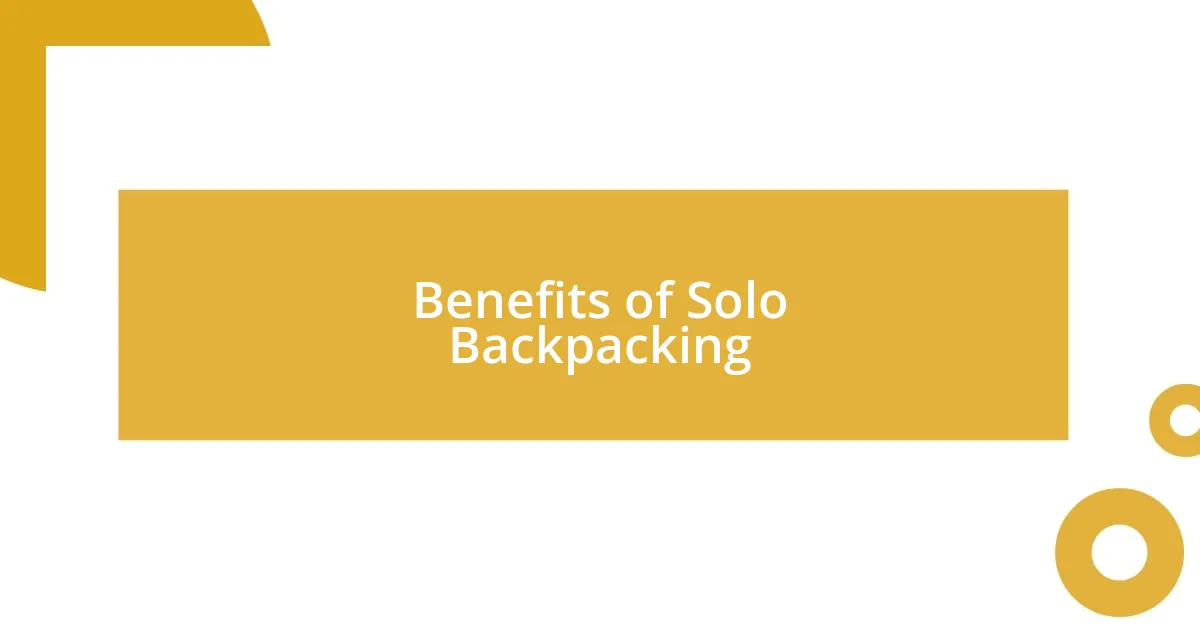
Benefits of Solo Backpacking
The benefits of solo backpacking are numerous and enriching. One of the most significant advantages is the opportunity for personal growth. When I embarked on a solo trip through unfamiliar terrain, I felt a mix of anxiety and exhilaration. Facing challenges alone, like setting up camp or navigating tricky routes, taught me resilience and adaptability. Have you ever realized how much you can grow when you step outside your comfort zone?
Another key benefit is the chance to build a stronger connection with nature. On one particularly memorable hike, I took a moment to sit quietly in a sun-dappled clearing. As I listened to the rustle of leaves and the distant sound of a stream, I felt an overwhelming sense of peace. Being alone in nature allows you to truly absorb the beauty around you. It’s a way to escape the noise of everyday life and find solace in the simplicity of the environment.
Additionally, solo backpacking can amplify your sense of freedom. You have the autonomy to choose your path, pace, and experiences without needing to coordinate with others. I recall one time when I spontaneously decided to change my route, leading me to a hidden waterfall that took my breath away. Isn’t it liberating to have the flexibility to make decisions on the fly? This freedom is empowering and allows for a deeply personal journey that can significantly enhance your overall travel experience.
| Benefit | Description |
|---|---|
| Personal Growth | Enables resilience and adaptability through tackling challenges alone. |
| Connection with Nature | Intensifies appreciation for the environment, fostering peace and tranquility. |
| Sense of Freedom | Allows for spontaneous decisions and exploration, enhancing your adventure. |
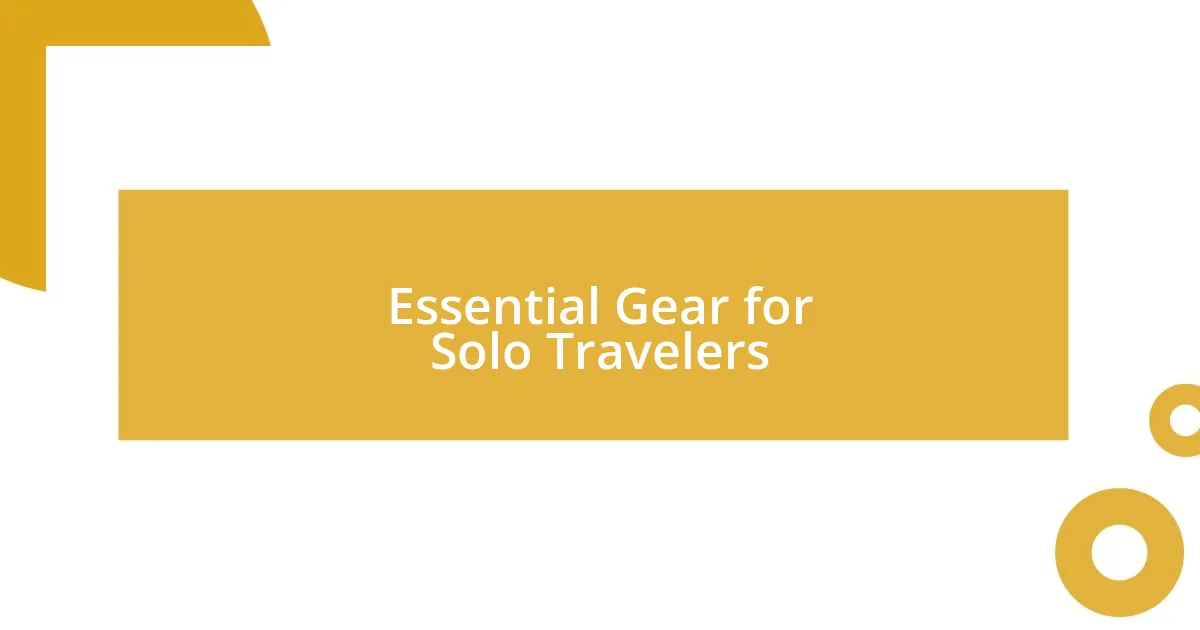
Essential Gear for Solo Travelers
Essential Gear for Solo Travelers
When it comes to solo backpacking, having the right gear can make all the difference in your experience. I remember one trip where I underestimated the importance of a quality backpack. A well-fitted pack not only distributes weight evenly but can also keep your spirits high as you navigate various terrains. Investing in good gear is part of preparing for those memorable moments in nature, don’t you think?
Here’s a list of essential gear that I personally swear by for solo trips:
- Backpack: Choose one with a comfortable fit and sufficient capacity for your essentials.
- Tent: A lightweight, easy-to-pitch option can provide shelter and solace after a long day.
- Sleeping Bag: Look for one that’s rated for the weather conditions you’ll encounter.
- Stove: A compact camping stove allows for warm meals, which can lift your mood on cold evenings.
- Water Filter: Clean drinking water is vital, and a portable filter can save you from heavy water loads.
- First Aid Kit: Always include this—it’s essential for any unexpected bumps along the way.
- Navigation Tools: A map and compass (or a good GPS app) are crucial for staying on track.
- Multi-tool: A sturdy multi-tool can handle numerous tasks from food prep to quick fixes on gear.
Each time I pack for a trip, I feel a mix of excitement and anticipation. Remember that time I forgot my sleeping mat? I ended up using extra clothes to cushion myself, but it was definitely a lesson learned! Packing thoughtfully not only prepares you for the physical journey ahead but also sets the stage for those deeper emotional experiences that solo traveling often brings. Doesn’t it feel rewarding to be well-equipped as you venture into the great unknown?
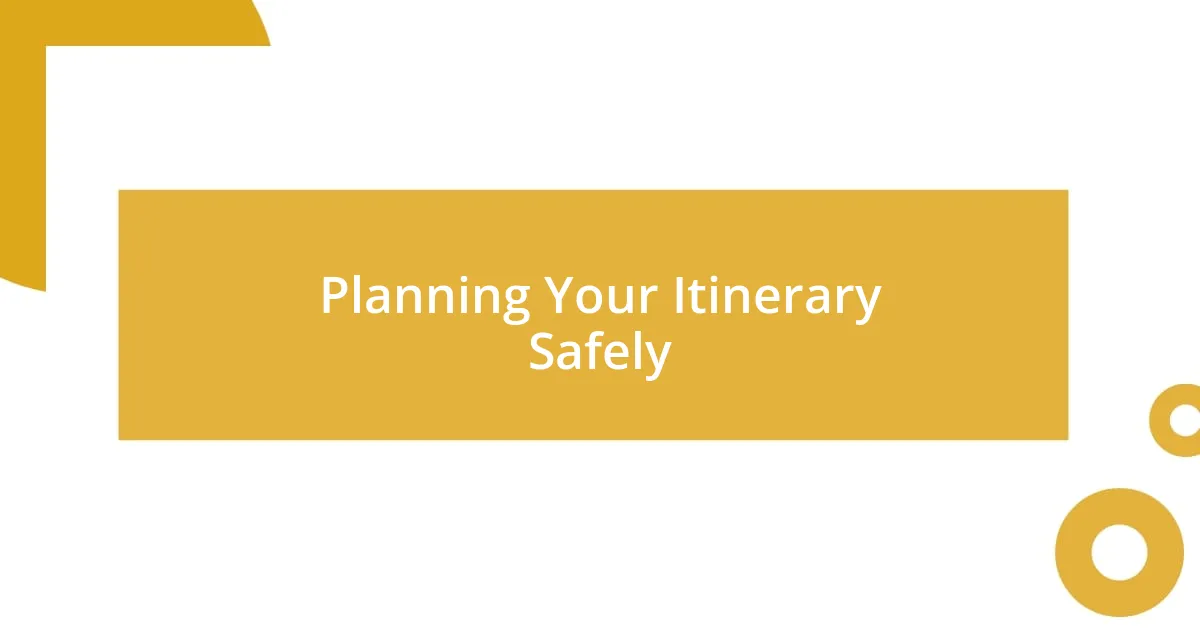
Planning Your Itinerary Safely
When planning your itinerary, safety should always be a top priority. I can recall a time when I mapped out my route meticulously, factoring in distance, elevation, and weather conditions. I felt much more secure knowing that I had reliable backup information, including offline maps stored on my phone. Do you take the time to assess the terrain and climate before hitting the trails?
It’s also crucial to share your plans with someone you trust. On one solo journey, I provided a family member with my itinerary, including expected check-in times. This simple act provided peace of mind, knowing that someone was aware of my whereabouts. Have you ever thought about how this small step can create a safety net for your adventure?
Finally, always have a flexible approach. One afternoon, I faced unexpected torrential rain, forcing me to alter my route. Instead of panicking, I took a detour that led me to an awe-inspiring viewpoint I hadn’t planned to see. This experience taught me that while planning is essential, embracing spontaneity can lead to unexpected gems. How do you react when your carefully laid plans go awry?
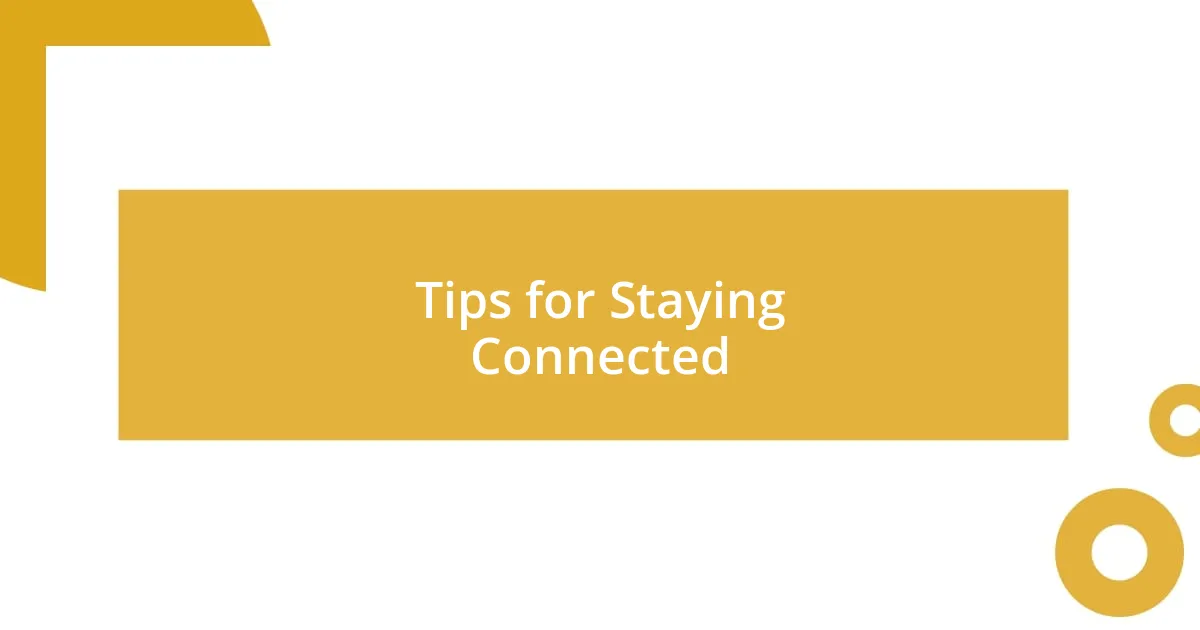
Tips for Staying Connected
Staying connected during solo backpacking trips is essential for both safety and personal comfort. I remember my first trip where I relied on my phone for navigation. It was actually quite nerve-wracking when the battery drained. To avoid a similar situation, I now carry a portable charger. It’s a small investment that can provide peace of mind, especially when you’re in remote areas. Have you ever experienced that sudden surge of panic when you realize your lifeline is losing power?
Using apps that work offline has significantly enhanced my solo adventures. On one trek, I downloaded maps and trail information ahead of time. When I found myself without service, it felt liberating to still navigate confidently. This not only kept me safe but also allowed me to truly disconnect from the hustle of day-to-day life. How do you balance modern technology with the desire to unplug while out in nature?
Another tip I cherish is to schedule regular check-ins with friends or family. During a recent trip, I set predetermined times to send a quick message, letting loved ones know I was safe. This practice not only kept them informed but also gave me a sense of camaraderie. Have you tried this approach? Sharing your adventures, even from afar, can make you feel connected, transforming those moments of solitude into shared experiences.
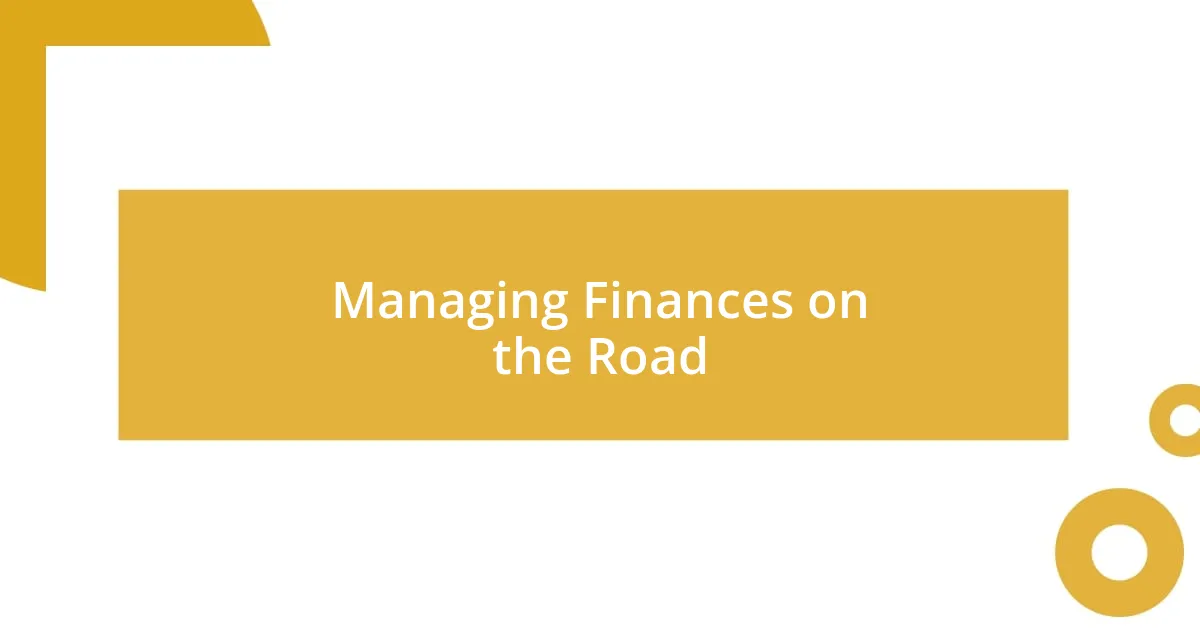
Managing Finances on the Road
Managing finances while on the road can feel daunting, but I’ve discovered a few practical strategies that work wonders. On one trip through Southeast Asia, I set a daily budget and tracked my expenses using a simple app. It was eye-opening to see where my money went, and I began allocating more for experiences like street food and local tours rather than just accommodation. Does keeping a budget change your perspective on spending?
I also learned the value of having multiple ways to access cash. During a solo trek in Europe, an ATM swallowed my card, leaving me in a bind. Thankfully, I had a backup card and a stash of cash tucked away. It was a lesson in preparedness—the kind of lesson that gives you confidence knowing you’re covered even when things don’t go as planned. Have you ever experienced a financial hiccup while traveling?
In addition, I’ve found that leveraging local markets can add both flavor and savings to my travels. For instance, while in Mexico, I shopped for groceries at markets instead of dining out for every meal. This allowed me to experience local culture intimately. Eating fresh fruits and homemade tortillas while sitting on a bench surrounded by locals enriched my trip beyond anything a restaurant could offer. What creative ways do you find to save while still enjoying the local scene?
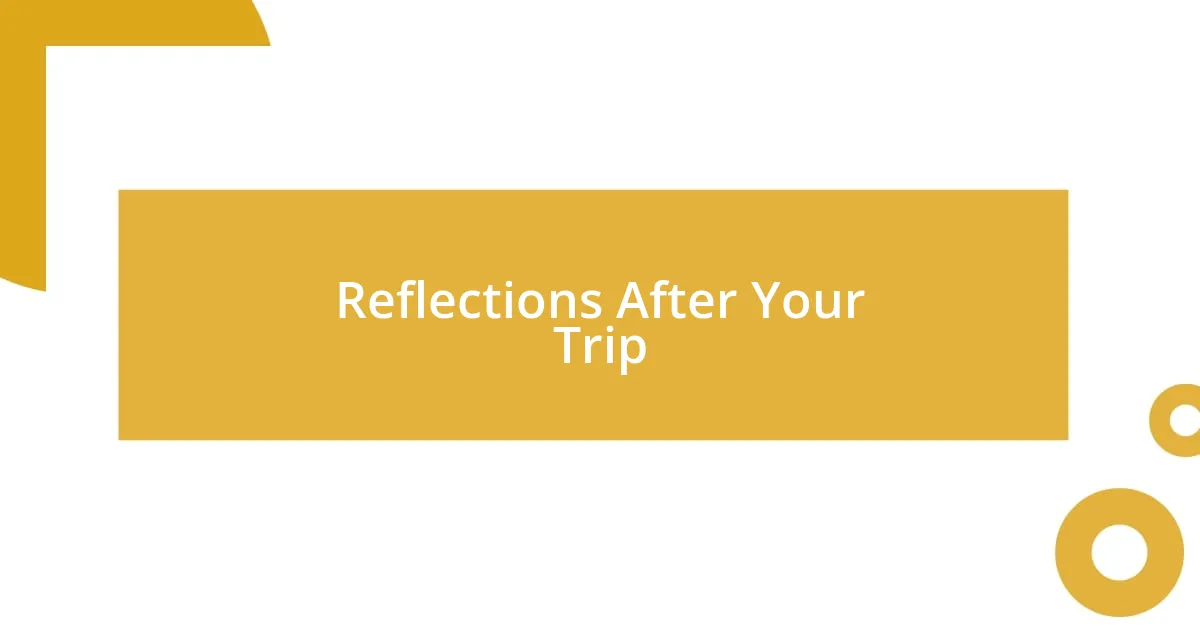
Reflections After Your Trip
Reflecting on my solo backpacking trips brings a whirlwind of emotions. After my last adventure, I found myself reminiscing about the lessons I learned on the trail. I vividly remember sitting by a serene lake at sunset, processing the quiet moments of solitude that allowed me to reconnect with myself. Do you ever feel like you discover a different side of yourself when you’re alone in nature?
One thing I’ve noticed is that journaling during or immediately after a trip can be incredibly cathartic. I started jotting down my thoughts and feelings after long hikes, and it helped me internalize those experiences. On one occasion, I wrote about the exhilaration I felt when I climbed a challenging ridge; it felt like a metaphor for overcoming obstacles in daily life. How do you document your travel experiences—is it through photography, writing, or perhaps sharing stories with friends?
Finally, reflecting on my interactions with fellow travelers often highlights the beauty of camaraderie amidst solitude. After a long trek, I shared a meal with some travelers I met along the way, and their stories enriched my own journey. Just thinking about how these connections can evolve into lasting friendships makes me wonder: What impact have interactions on the road had on your perspective?




